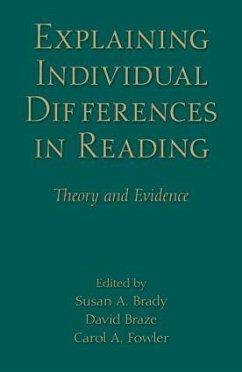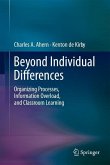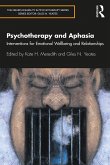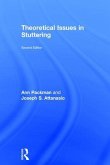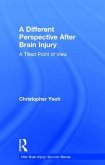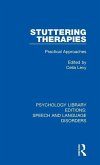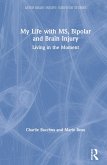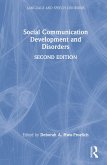Explaining Individual Differences in Reading
Theory and Evidence
Herausgeber: Brady, Susan A; Fowler, Carol A; Braze, David
Explaining Individual Differences in Reading
Theory and Evidence
Herausgeber: Brady, Susan A; Fowler, Carol A; Braze, David
- Gebundenes Buch
- Merkliste
- Auf die Merkliste
- Bewerten Bewerten
- Teilen
- Produkt teilen
- Produkterinnerung
- Produkterinnerung
This volume focuses on a wide array of current research topics, examining the scope, limits and implications of phonological theory in research into reading development and reading disabilities. It provides an essential resource for researchers interested in the cognitive foundations of reading and literacy and those working in reading and learning disabilities.
Andere Kunden interessierten sich auch für
![Beyond Individual Differences Beyond Individual Differences]() Charles A. AhernBeyond Individual Differences39,99 €
Charles A. AhernBeyond Individual Differences39,99 €![Psychotherapy and Aphasia Psychotherapy and Aphasia]() Psychotherapy and Aphasia186,99 €
Psychotherapy and Aphasia186,99 €![Theoretical Issues in Stuttering Theoretical Issues in Stuttering]() Ann PackmanTheoretical Issues in Stuttering197,99 €
Ann PackmanTheoretical Issues in Stuttering197,99 €![A Different Perspective After Brain Injury A Different Perspective After Brain Injury]() Christopher YeohA Different Perspective After Brain Injury174,99 €
Christopher YeohA Different Perspective After Brain Injury174,99 €![Stuttering Therapies Stuttering Therapies]() Stuttering Therapies153,99 €
Stuttering Therapies153,99 €![My Life with MS, Bipolar and Brain Injury My Life with MS, Bipolar and Brain Injury]() Charlie BacchusMy Life with MS, Bipolar and Brain Injury174,99 €
Charlie BacchusMy Life with MS, Bipolar and Brain Injury174,99 €![Social Communication Development and Disorders Social Communication Development and Disorders]() Social Communication Development and Disorders174,99 €
Social Communication Development and Disorders174,99 €-
-
-
This volume focuses on a wide array of current research topics, examining the scope, limits and implications of phonological theory in research into reading development and reading disabilities. It provides an essential resource for researchers interested in the cognitive foundations of reading and literacy and those working in reading and learning disabilities.
Hinweis: Dieser Artikel kann nur an eine deutsche Lieferadresse ausgeliefert werden.
Hinweis: Dieser Artikel kann nur an eine deutsche Lieferadresse ausgeliefert werden.
Produktdetails
- Produktdetails
- Verlag: Taylor & Francis Ltd (Sales)
- Seitenzahl: 292
- Erscheinungstermin: 18. April 2011
- Englisch
- Abmessung: 231mm x 157mm x 23mm
- Gewicht: 522g
- ISBN-13: 9781848729360
- ISBN-10: 1848729367
- Artikelnr.: 32551098
- Herstellerkennzeichnung
- Libri GmbH
- Europaallee 1
- 36244 Bad Hersfeld
- gpsr@libri.de
- Verlag: Taylor & Francis Ltd (Sales)
- Seitenzahl: 292
- Erscheinungstermin: 18. April 2011
- Englisch
- Abmessung: 231mm x 157mm x 23mm
- Gewicht: 522g
- ISBN-13: 9781848729360
- ISBN-10: 1848729367
- Artikelnr.: 32551098
- Herstellerkennzeichnung
- Libri GmbH
- Europaallee 1
- 36244 Bad Hersfeld
- gpsr@libri.de
Susan Brady is a Professor of Psychology at the University of Rhode Island. Her basic research focuses primarily on phonological factors in reading ability. In addition, in applied research she investigates the ingredients, such as teacher knowledge, necessary for improving reading achievement in the primary grades. David Braze, a linguist, concentrates his research on the cognitive bases underlying ability to comprehend speech and print. He employs online methods, including monitoring eye-movements during reading, to investigate bottlenecks in comprehension. Likewise, he explores how characteristics of text interact with individual differences in cognitive factors to impact reading comprehension. Carol Fowler is a Professor of Psychology at University of Connecticut. Her research includes an emphasis on the relation between speech production and perception, and the implications of that relation for phonological theory. One aspect of that research explores the nature of the phonological structures accessed by skilled readers of a variety of writing systems. The three editors are all Senior Scientists at Haskins Laboratories in New Haven, Connecticut.
Foreword by William Tunmer. Preface. Part 1. Theoretical Foundations:
Phonology and Reading. C.A. Fowler, How Theories of Phonology May Enhance
Understanding of the Role of Phonology in Reading Development and Reading
Disability. Part 2. Phonological Factors in Learning to Read. D. Braze,
G.W. McRoberts, C. McDonough, Early Precursors of Reading-Relevant
Phonological Skills. D.L. Share, On the Role of Phonology in Reading
Acquisition: The Self-Teaching Hypothesis. S.A. Brady, Efficacy of Phonics
Teaching for Reading Outcomes: Indications from Post NRP Research. N.
Patton Terry, H. Scarborough, The Phonological Hypothesis as a Valuable
Framework for Studying the Relation of Dialect Variation to Early Reading
Skills. Part 3. Sources of Individual Differences Beyond Phonological
Deficits . M.J. Snowling, Beyond Phonological Deficits: Sources of
Individual Differences in Reading Disability. H.W. Catts, S. Adlof,
Phonological and Other Language Deficits Associated with Dyslexia. C.
Perfetti, Phonology is Critical in Reading -- But a Phonological Deficit is
Not the Only Source of Low Reading Skill. Part 4. Unraveling the Biology of
Reading and Reading Differences. B. Byrne, Evaluating the Role of
Phonological Factors in Early Literacy Development: Insights from
Experimental and Behavior-Genetic Studies. R. Olson, Genetic and
Environmental Influences on Phonological Abilities and Reading Achievement.
J.J. Diehl, S.J. Frost, W.E. Mencl, K.R. Pugh, Neuroimaging and the
Phonological Deficit Hypothesis.
Phonology and Reading. C.A. Fowler, How Theories of Phonology May Enhance
Understanding of the Role of Phonology in Reading Development and Reading
Disability. Part 2. Phonological Factors in Learning to Read. D. Braze,
G.W. McRoberts, C. McDonough, Early Precursors of Reading-Relevant
Phonological Skills. D.L. Share, On the Role of Phonology in Reading
Acquisition: The Self-Teaching Hypothesis. S.A. Brady, Efficacy of Phonics
Teaching for Reading Outcomes: Indications from Post NRP Research. N.
Patton Terry, H. Scarborough, The Phonological Hypothesis as a Valuable
Framework for Studying the Relation of Dialect Variation to Early Reading
Skills. Part 3. Sources of Individual Differences Beyond Phonological
Deficits . M.J. Snowling, Beyond Phonological Deficits: Sources of
Individual Differences in Reading Disability. H.W. Catts, S. Adlof,
Phonological and Other Language Deficits Associated with Dyslexia. C.
Perfetti, Phonology is Critical in Reading -- But a Phonological Deficit is
Not the Only Source of Low Reading Skill. Part 4. Unraveling the Biology of
Reading and Reading Differences. B. Byrne, Evaluating the Role of
Phonological Factors in Early Literacy Development: Insights from
Experimental and Behavior-Genetic Studies. R. Olson, Genetic and
Environmental Influences on Phonological Abilities and Reading Achievement.
J.J. Diehl, S.J. Frost, W.E. Mencl, K.R. Pugh, Neuroimaging and the
Phonological Deficit Hypothesis.
Foreword by William Tunmer. Preface. Part 1. Theoretical Foundations:
Phonology and Reading. C.A. Fowler, How Theories of Phonology May Enhance
Understanding of the Role of Phonology in Reading Development and Reading
Disability. Part 2. Phonological Factors in Learning to Read. D. Braze,
G.W. McRoberts, C. McDonough, Early Precursors of Reading-Relevant
Phonological Skills. D.L. Share, On the Role of Phonology in Reading
Acquisition: The Self-Teaching Hypothesis. S.A. Brady, Efficacy of Phonics
Teaching for Reading Outcomes: Indications from Post NRP Research. N.
Patton Terry, H. Scarborough, The Phonological Hypothesis as a Valuable
Framework for Studying the Relation of Dialect Variation to Early Reading
Skills. Part 3. Sources of Individual Differences Beyond Phonological
Deficits . M.J. Snowling, Beyond Phonological Deficits: Sources of
Individual Differences in Reading Disability. H.W. Catts, S. Adlof,
Phonological and Other Language Deficits Associated with Dyslexia. C.
Perfetti, Phonology is Critical in Reading -- But a Phonological Deficit is
Not the Only Source of Low Reading Skill. Part 4. Unraveling the Biology of
Reading and Reading Differences. B. Byrne, Evaluating the Role of
Phonological Factors in Early Literacy Development: Insights from
Experimental and Behavior-Genetic Studies. R. Olson, Genetic and
Environmental Influences on Phonological Abilities and Reading Achievement.
J.J. Diehl, S.J. Frost, W.E. Mencl, K.R. Pugh, Neuroimaging and the
Phonological Deficit Hypothesis.
Phonology and Reading. C.A. Fowler, How Theories of Phonology May Enhance
Understanding of the Role of Phonology in Reading Development and Reading
Disability. Part 2. Phonological Factors in Learning to Read. D. Braze,
G.W. McRoberts, C. McDonough, Early Precursors of Reading-Relevant
Phonological Skills. D.L. Share, On the Role of Phonology in Reading
Acquisition: The Self-Teaching Hypothesis. S.A. Brady, Efficacy of Phonics
Teaching for Reading Outcomes: Indications from Post NRP Research. N.
Patton Terry, H. Scarborough, The Phonological Hypothesis as a Valuable
Framework for Studying the Relation of Dialect Variation to Early Reading
Skills. Part 3. Sources of Individual Differences Beyond Phonological
Deficits . M.J. Snowling, Beyond Phonological Deficits: Sources of
Individual Differences in Reading Disability. H.W. Catts, S. Adlof,
Phonological and Other Language Deficits Associated with Dyslexia. C.
Perfetti, Phonology is Critical in Reading -- But a Phonological Deficit is
Not the Only Source of Low Reading Skill. Part 4. Unraveling the Biology of
Reading and Reading Differences. B. Byrne, Evaluating the Role of
Phonological Factors in Early Literacy Development: Insights from
Experimental and Behavior-Genetic Studies. R. Olson, Genetic and
Environmental Influences on Phonological Abilities and Reading Achievement.
J.J. Diehl, S.J. Frost, W.E. Mencl, K.R. Pugh, Neuroimaging and the
Phonological Deficit Hypothesis.

